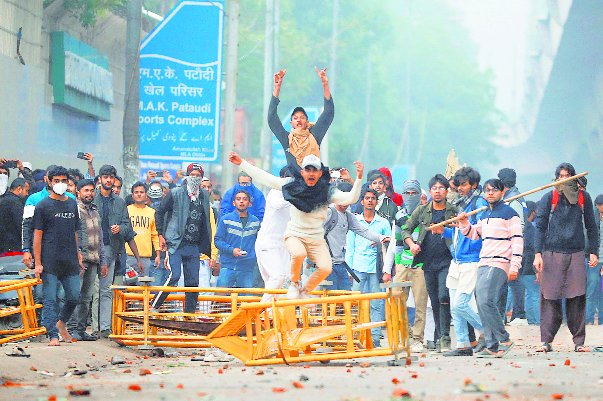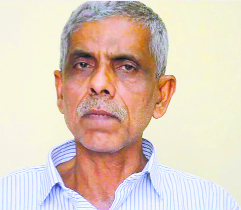
Young warriors: Students from public universities are coming to the streets, and trying to resist the onslaught on people’s democratic rights and aspirations.
Avijit Pathak
Sociologist
Is it that the ruling regime is becoming increasingly insecure, and using almost mindlessly the coercive apparatus of the state to suppress all alternative and critical voices? Otherwise, how does one make sense of what happened at Delhi’s Jamia Millia Islamia — the way the police entered the campus, and fired tear gas shells inside the university library, and brutally attacked young boys and girls? Or, when we saw the cops attacking the students of Aligarh Muslim University and Jawaharlal Nehru University, it was a moment of realisation. Here is a government intoxicated with the power emanating from the triumphant majoritarianism; it has lost the art of conversation, or the sensitivity needed to understand what these young students — educated, political and reflexive — are thinking about.
What possibly worries the ruling regime is that, despite its meticulously designed propaganda machinery and discourses of ‘nationalism’ disseminated through all sorts of television channels, these students — because of some sort of liberating education — refuse to be carried away. They could see that the Citizenship Amendment Bill is essentially discriminatory, it would destroy the ethos of secularism and cultural pluralism, and cause unimaginable harassment to the poor, the marginalised and the minorities. They could also realise that with the increasing commodification of education — an agenda of the neoliberal discourse as articulated in the New Education Policy — an attempt is being made to systematically destroy the spirit of public universities, and the project of good quality/affordable education, and resultant humanistic and critical thinking. At a time when mainstream politics, including the opposition politics, has become morally bankrupt, ideologically impoverished, and crudely utilitarian for instant and temporal power, the critical voices of the youth — innumerable young girls and boys — arouse new hope: the possibility of a counter-narrative. And this seems to be the chief reason why the ‘system’ is so hostile to the youth who think, reflect, resist and imagine a different world.
In this context it is equally important to realise that these students of Jamia, Aligarh, JNU, DU, HCU or Jadavpur are defying the meaning of being a student as the champions of militant nationalism or the market-driven consumerism seek to define. For these ‘nationalists’, Marx is evil, Gandhi is effeminate, protest is ugly, feminism is immoral, and secularism is a western concept; and hence, the students of, say, JNU have to be castigated as potentially ‘anti-national’ and ‘ethically immoral’. Likewise, the students of Jamia or Aligarh have to be continually suspected because their ‘Islamic’ traits might challenge the discourse of Hindutva. In other words, these students, they think, are not ‘loyal soldiers’ dedicated to the glory of the ‘Hindu nation’. No wonder, the Establishment prefers to recruit vice-chancellors as deputies of the ruling regime; their agenda is to destroy these universities from within, and instruct the police and paramilitary forces to demoralise the students and teachers through all sorts of coercive measures.
Likewise, the new middle class —almost seduced by the neoliberal discourse of an atomised/competitive individual striving for success through purely instrumental and skill-oriented education — has begun to loathe the idea of a public university that teaches foundational sciences, liberal arts and social sciences. Politics, for them, is a diversion; philosophy or history is irrelevant; and the only thing that matters is a job in the corporate sector with an attractive salary package. Hence, students are essentially consumers; and teachers are just service providers. They prefer ‘apolitical’ institutes of technology and management, or fancy private universities insulated from the storm outside. Is it the reason why one hardly hears any critical voice from the much-hyped IITs and IIMs?
From Assam to Bengal, the country is burning because of the CAB; students from public universities are coming to the streets, and trying to resist this onslaught on people’s democratic rights and aspirations. Possibly, this power or this enchanting experience of coming out of naked individualism or culture of narcissism, and experiencing ‘private troubles’ as (to use the language of sociologist C Wright Mills) ‘public issues’ is what the ruling regime is afraid of. It has no problem if the youth continue to live as greedy consumers, and find the source of entertainment in either mob lynching or the Honey Singh variety of music. Nor does it have any problem if the IIT/IIM products leave the country, and migrate to the US or Canada. But then, the question would be asked: why should the taxpayer’s money be wasted for a university like JNU? This is the ultimate irony —the facade of the dominant discourse of nationalism.
Yet, amid this brutality and insensitivity inherent in the rising totalitarian politics nurtured by a set of authoritarian personalities and constructed imageries of hyper-masculine ‘saviours’, there is still hope. As the students come to the streets, we begin to realise that there are limits to the package of falsehood; and the idea of pluralism, religious syncretism, socio-economic equality and justice has not yet disappeared from our consciousness. Is it the beginning of fearlessness?
Join Whatsapp Channel of The Tribune for latest updates.




























